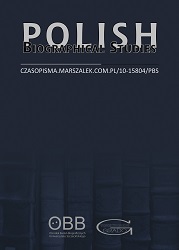W poszukiwaniu koncepcji politycznej „Dziś i Jutro” List Witolda Bieńkowskiego do Bolesława Piaseckiego z 1947 r.
In search of the political concept of “Today and Tomorrow”. Witold Bienkowski’s letter to Bolesław Piasecki in 1947
Author(s): Ariel OrzełekSubject(s): Politics, Political Theory, Political history, WW II and following years (1940 - 1949), History of Communism
Published by: Wydawnictwo Naukowe GRADO
Keywords: Bolesław Piasecki; „Today and Tomorrow”; political thought; „PAX” Association; Witold Bieńkowski;
Summary/Abstract: Witold Bieńkowski (1906–1965) was a Polish Catholic activist, entangled in the dilemmas of the era in which he lived. Before the war, he was associated with Catholic youth movements, during the war, he was an activist of the Front for the Rebirth of Poland. Ge devotedly worked to save Jews in the Council to Aid Jews „Żegota” and in the Jewish section of the Department of Internal Affairs of the Government Delegation for Poland. However, as early as 1944 he was accused of the murder of Ludwik Widerszal and Jerzy Makowiecki, officials from the Information and Propaganda Bureau of the Home Army Headquarters. On the eve of the Warsaw Uprising, he found himself in territories occupied by the Soviet army, where he attempted to act as a government representative for the lands free from Germany. He then made contact with Bolesław Piasecki, but soon he was arrested by the Soviets, with whom he probably held secret political talks. Released by the underground branch in May 1945, at the turn of summer and autumn 1945 legalized thanks to Piasecki, soon assuming the position of editor-in-chief of the „Today and Tomorrow” magazine, and two years later he was appointed a member of the Legislative Sejm. He was a spokesman for the recognition of People’s Poland not only for geopolitical but also ideological reasons, proclaiming the need for radical socio-economic transformations, encouraging Catholics to support them. To gain the authority of this concept, he demanded that the communists should represent Catholics politically, but not in the form of a traditional Christian Democrat party, but with time he came to the conclusion that an informal political environment, even the most influential, meant less than a legal party. Therefore, he became a spokesman for the radical left-wing Catholic party, and when this vision failed, he persuaded Piasecki to formalize their movement ideologically and politically. This is documented by the quoted letter from Bieńkowski to the leader of „Today and Tomorrow” of December 1947, in which he noted that the environment may disintegrate if it is not bound by a specific form serving to implement the program. Bieńkowski quarreled with Piasecki in 1948, later becoming the press clerk of Primate Stefan Wyszyński, and briefly associated with the Christian Social Association. He died, forgotten in 1965, charged with suspicions of the murder of BIP officials. Regardless of this, Piasecki largely took up his concept, creating the „PAX” Association, grading, as Bieńkowski wanted, his leadership and giving it a clear, ambitious program of „overcoming the winner” through „multi-worldview socialism.”
Journal: Polish Biographical Studies
- Issue Year: 10/2022
- Issue No: 1
- Page Range: 147-180
- Page Count: 34
- Language: Polish

